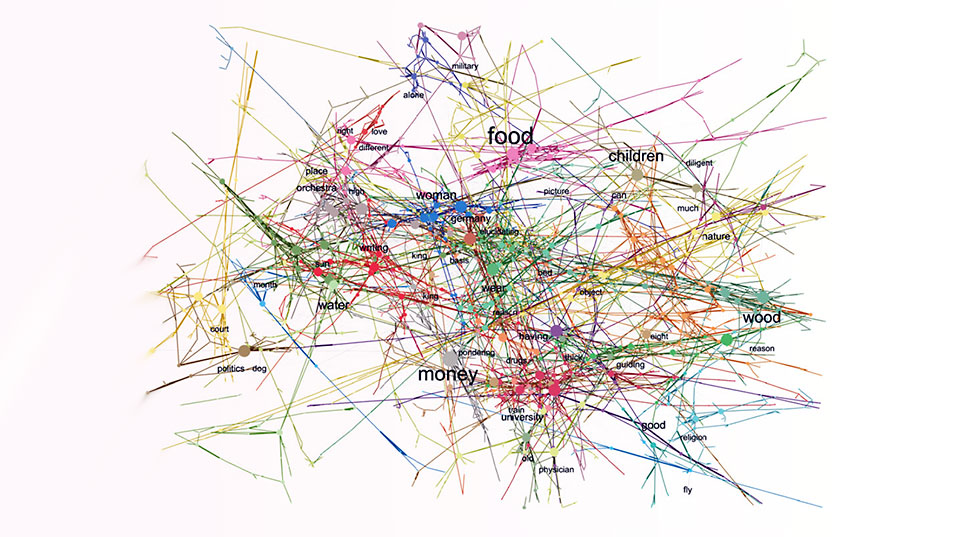With age comes knowledge.
Text: Yvonne Vahlensieck
We learn new facts and concepts well into old age. Psychologists at Basel University are investigating how, over the course of our lives, our memory adapts to this expansion in knowledge.
It is a well-known phenomenon that our mental faculties steadily deteriorate as we grow older. Older people tend to forget names, have poor short-term memory, and generally take longer to do things. “When we’re talking about old age, we’re usually talking about some change for the worse,” confirms Rui Mata, a psychologist who heads the University of Basel’s Center for Cognitive and Decision Sciences. However, there is one respect where seniors have the edge: They have more accumulated knowledge at their disposal. “That’s the only area where being older is actually an advantage,” he says.
This is evidenced by a simple experiment that involves naming as many kinds of animal as possible in a minute. On average, those aged over 65 can name three animals fewer than younger-generation participants. “However, older people will more often name less obvious animals such as a rare species of parrot or a particular breed of dog,” says Mata.
“This means that while we all keep accumulating unique knowledge throughout life, young people differ very little from one another in terms of what they know.” Older people are at an advantage, which manifests itself, for instance, in that they have a larger vocabulary and are more likely to be familiar with uncommon words.
Mental knowledge database
This mental repository of acquired knowledge is known as semantic memory. It contains all the facts and concepts that we learn in our lives, be they words, types of animal, historical facts or cultural knowledge. Although this type of memory has long been known to exist, it is only in recent years that technological advances have enabled researchers to investigate its structure in any detail. For instance, Mata and his team used computer models and statistical methods to analyze the order in which participants name animals. “People will typically start with domestic animals such as dog and cat. Once they find that they can’t think of anything new in that category, they’ll jump to the next one, say jungle animals such as crocodile and snake,” says Mata.
Findings like these led Mata and his fellow psychologists to conclude that facts are not stored randomly in our semantic memory. Based on shared characteristics, they will instead group around specific nodes, which are known as hubs. For example, there are hubs for domestic animals, furry animals, tools, kinds of fruit, and an infinite number of other categories.
This form of organization allows us to retrieve information quickly: When we are trying to think of the name of an animal seen in a photograph, we do not have to search our entire memory. Instead, we call up an appropriate hub (e.g. “winged animals”), which then allows us to find the name (say “goose”) more quickly. This organizing principle, also known as small-world structure, is found in a wide variety of areas, from the interconnections in social networks to a fruit fl y’s nervous system to airline route networks. “Ultimately, semantic memory isn’t simply a measure of how much a person knows, it also depends on knowledge being stored in a structured way,” Mata explains.
Comparing old and young
Mata, who specializes in the psychological aspects of aging, is interested particularly in how these structures change as we grow older and gather more knowledge. The question of whether older people’s semantic memory is organized differently from young people’s is being addressed by a new large-scale word association study. It compares people from different age groups with one another and involves participants spontaneously naming all the things they associate with a particular word.
Based on thousands of such associations, Mata then plans to individually map each participant’s semantic memory. The resulting three-dimensional map will pinpoint how closely specific words and concepts are linked and which hubs they group around. Mata expects to find greater variation among older than among younger people on account of differing amounts of individually accumulated knowledge.
In the future, results from this study and others like it could help refine diagnostic tests for degenerative brain diseases. When checking for signs of these, physicians usually test other types of memory such as episodic memory, where personal events are recorded, or short-term memory, with little attention given to semantic memory. Although it is known that Alzheimer’s patients tend to retain factual knowledge for longer than they do personal memories, there are special forms of dementia that mainly affect a patient’s semantic memory, making it very difficult for them to come up with the correct names for animals, tools or fruits, for instance.
“Like a library”
Psychologists have begun to suspect that the ever-growing encyclopedias in our heads may also have their downside. Mata speculates that an excess of knowledge is one of the reasons why certain cognitive skills deteriorate in old age: “It’s like a library: The more books there are, the longer it takes to find a particular one.” This might explain why older people sometimes have to rack their brains for a name or calendar date they know.
Mata and his team of researchers are currently devising experiments to test this relatively new hypothesis. While many questions have yet to be answered, one fact remains: Older people have more knowledge than the younger generation – even if it can take a little longer to access.
Rui Mata is Associate Professor at the Faculty of Psychology of the University of Basel and Head of the Center for Cognitive and Decision Sciences.
More articles in the current issue of UNI NOVA.

